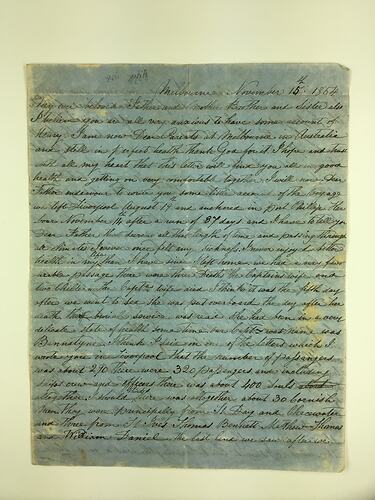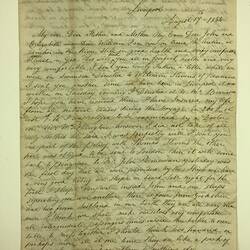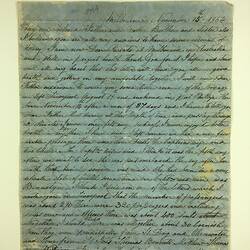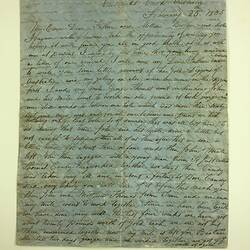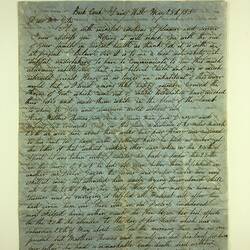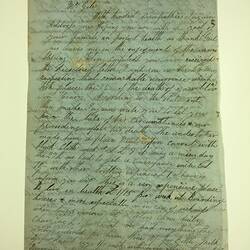Heading to the Victorian Gold Diggings:
Henry Giles was the elder son of yeoman farmers who worked a farm in Porthmeor, West Penrith in Cornwall, England. Although it is likely that he would have been expected to continue the family farming tradition, Henry instead sought his fortune on the Victorian goldfields. According to Henry's descendants it appears that he fathered an illegitimate child to a neighbouring farmer's daughter; it is not known whether he took this decision for himself, or whether it was forced upon him.
He departed Liverpool with his travelling companion John Stevens aboard the White Star Line clipper 'Arabian' on 19 August 1854. Henry went to Creswick's Creek about 20 kilometres north of Ballarat where European miners had found gold in 1852. At peak mining times, it is estimated that over 25,000 miners were in the Creswick area.
Letters Home:
The Museum holds a collection of six original handwritten letters, four written by Cornish migrant Henry Giles to his family during his voyage to Australia on the clipper ship 'Arabian' and from the central Victorian goldfields in 1854-55; and two written by John Stevens to Henry's father in 1855. The letters dates range from 17 August 1854 to 4 September 1855.
These letters provide a detailed and revealing record of a young Cornish migrant's experiences of mid-nineteenth century shipboard travel and the Victorian goldfields in the years immediately after the gold rush began in 1851. They demonstrate the very real challenges of distance from home, and the stretches of time waiting between letters from distant families. They offer insights into the difference for many miners between the dreams and expectations of quick wealth on the goldfields and the realities of meagre finds and harsh and dangerous working and living conditions.
Letter: Setting Sail:
The first letter (HT 57194) Henry wrote onboard the ship while waiting to set sail (17 August 1854). He describes the other passengers, activities, and conditions, as well as his life insurance and many pleas to be remembered by his family and neighbours. Letter: The Long Voyage: The next letter (HT 97195) was written after Henry had arrived in Melbourne on 14 November (15 November 1854) and he reports that he arrived safely and goes on to describe the voyage. He refers to the 'favourable passage', deaths at sea, the weather and temperatures, his own activities to deal with the boredom (which did not include card-playing!). Henry refers to his friend John Stevens with whom he travelled and that they are sharing rooms with 20 other Cornish men before heading to the diggings. He is very anxious to receive a letter from home with news of the farm and family.
Letter: Getting to the Diggings:
Another letter (HT 97196) was written from Creswick's Creek (3 December 1854) where Henry, his friend John Stevens and 20 other Cornish men all arrived on 20 November 1854. They had walked for four days from Melbourne, their luggage transported ahead by horse and dray. He met other men from Cornwell there and describes purchasing a tent and mining licence.
Henry mentions both fortune making and scant rewards from the diggings, but is confident he will make a living. Other descriptions include the cost of goods, the heavy drinking culture, the climate and the landscape and the non-recognition of the Sabbath. Henry again expresses his wish for a letter from home and his determination to do well.
Letter: A Hard Life:
The last surviving letter (HT 57197) written by Henry (25 February 1855) was from the Creswick's Creek goldfields. He describes his gold mining activities, the failures and successes, and how he works in small teams with other Cornish miners, which ends up being himself, John and a Matthew Thomas from Treen, Cornwell.
Henry describes more men from Cornwall arriving, that Australia as a destination is still much promoted at home, and that he doesn't regret his decision to come to Australia - although he describes the opportunities for great finds as lessening and the numbers of diggers only increasing. He also describes labour as scarce and wages low. Henry remains perturbed that he has still received no letter from his family and assures them he will work hard, send money home and not disappoint them.
Letters: Tragic News:
The next letter in the series (HT 57198) is written by Henry's friend John Stevens (28 May 1855) from Daisy Hill a mining settlement just over 40 kilometres north of Creswick in the Victorian central goldfields.
Sadly, John informs the Giles family that Henry has died. He describes how he, Henry and fellow miner Matthew Thomas left Creswick's Creek for Daisy Hill on 30 March 1855, but that Henry became ill with dysentery on 28 April after surving a leg injury. Despite being attended by a series of doctors, they were unable to save him and on 26 May, with John and Matthew by his side, he died.
John describes his death as 'a remarkable easy death' though being extremely weak and often speaking of home and that he would return immediately if he survived. John reports that Henry's health was excellent dring the voyage and after arriving, but that he was often ill in Creswick's Creek (which Henry's letters did not mention).
John is keen for the family to know he did everything he could for Henry, as did other members of the Cornish community, including arranging for a minister to attend him and officiate at his funeral. Henry was buried at a cemetery at Daisy Hill.
The final surviving letter (57199) was also written by John Stevens (4 September 1855) from Alma, near Maryborough in the Victorian central goldfields. John is following up his previous letter to the family dated 28 May 1855 regarding the death of his friend and their son Henry. He describes in detail the various costs involved in funding Henry's illness, funeral, burial and the registered correspondence, possibly as a hint for some recompense from the Giles family (which he never directly requests).
John assures the family that while not very successful they were industrious. He describes that he encloses a newsclipping about Colonial affairs, a note for his own brother to be passed on and a cutting of Henry's hair.
More Information
-
Keywords
English Immigration, Gold Rushes, Goldfields, Alluvial Gold Mining
-
Authors
-
Article types
